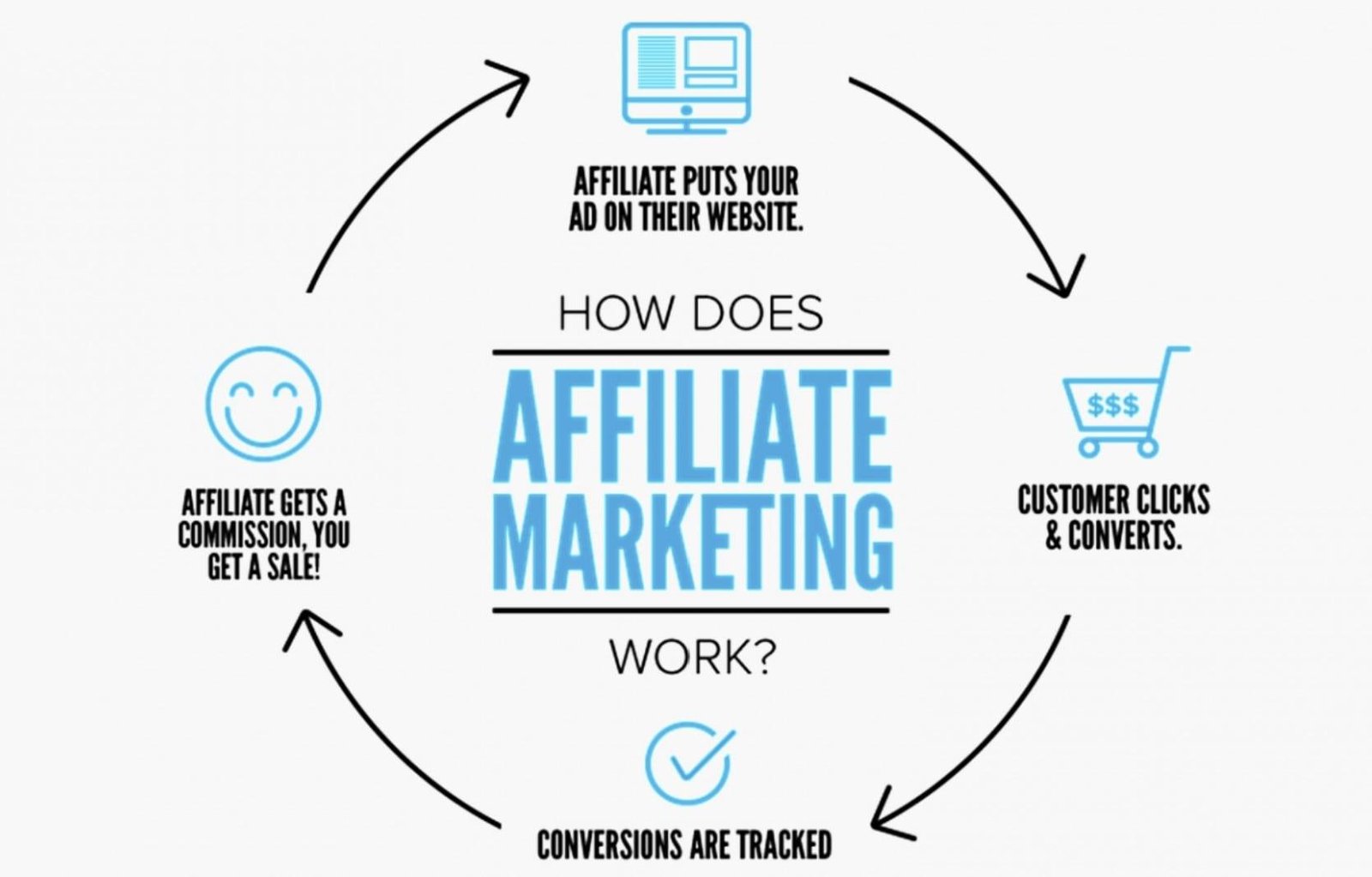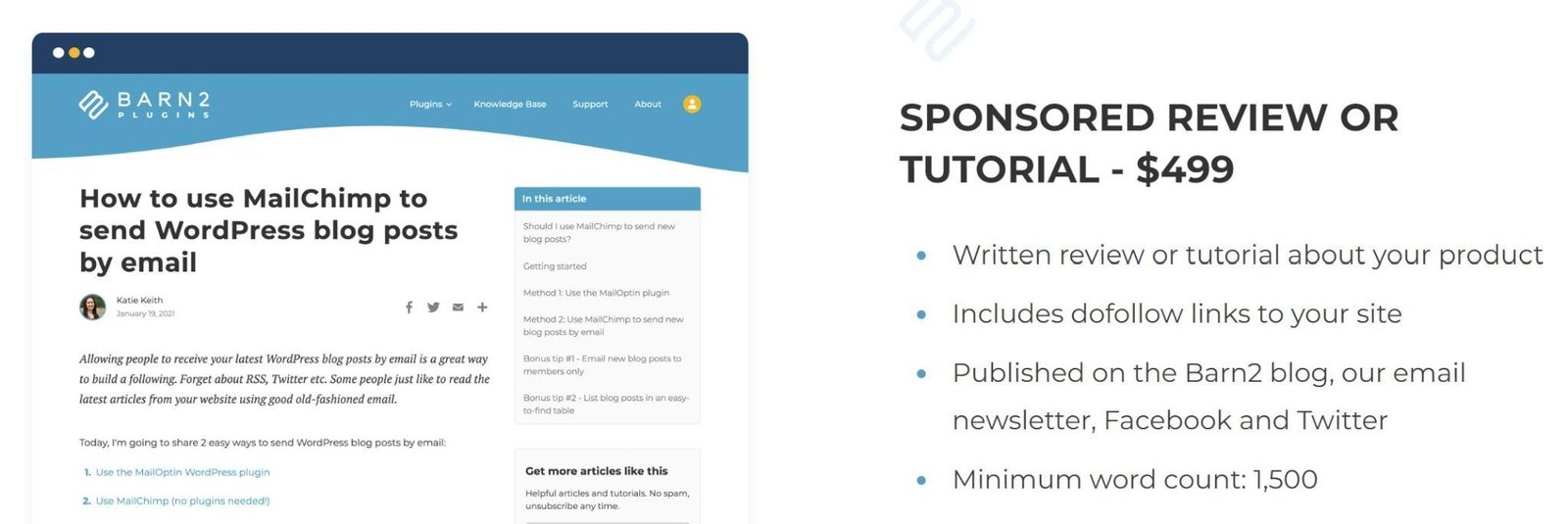Congratulations! If you’re reading this post, you’ve probably started generating decent traffic to your blog, which is why you feel it’s now the right time to start thinking about blog monetization.
The good news is that you’ve already done the hard part – building an audience. Once you have a loyal and growing base of blog readers and subscribers, there are many ways to make money from your blog. Let’s take a look at what they are.
How to monetize a blog?
Below, you’ll learn ways to monetize your blog effectively. Explore proven blog monetization strategies and revenue models to turn your passion into profit.
Affiliate marketing
Affiliate marketing is a proven tactic to earn money by promoting other companies’ products or services. In this method, you earn a percentage of the sale every time someone makes a purchase through your unique affiliate link.

For example, if you run a blog about fitness, you could promote workout gear or health supplements, earning a percentage of each sale.
As a money-making strategy, affiliate marketing has several benefits. It’s relatively easy to start, requires little upfront investment, and can provide passive income once your links are in place.
However, you have little control over the products’ quality and conversion rates, and it can take time to build trust with your audience. And the earnings may fluctuate, depending on sales volume.
Overall, affiliate marketing can be a lucrative option if you choose the right products and effectively engage your audience.
Membership content
Making money with a membership blog involves offering exclusive content or tools to subscribers who pay a recurring fee.
In this blog monetization strategy, you create a private area of your blog where members can access premium articles, videos, tutorials, or other valuable resources.
For example, if you run a photography blog, you could offer members in-depth photography courses or advanced editing tutorials.
This strategy has several advantages. It provides a steady income stream, builds a loyal community, and allows you to showcase your expertise.
However, creating and maintaining exclusive content requires consistent effort and time. You must continually deliver value to justify the subscription fee, and attracting enough members to make it profitable can be challenging.
Overall, a membership blog can be highly rewarding if you’re committed to providing ongoing, valuable content to your audience.
Sell templates
Selling digital templates on your blog is a lucrative way to generate income by offering ready-made, customizable resources that your audience can purchase and download.

These templates can range from website designs and social media graphics to business planners and worksheets, depending on your niche.
For example, if you run a blog about graphic design, you could sell templates for logos, brochures, or social media posts.
Since digital products require no inventory or shipping, your profit margins can be substantial. However, creating templates requires time and expertise, and you’ll need to market them effectively to drive sales.
Despite these challenges, selling digital templates can be a highly profitable venture if you consistently deliver value to your audience.
Sell online courses
Selling online courses on your blog is an excellent way to monetize your expertise by teaching your audience valuable skills or knowledge.
You create comprehensive lessons, often in video or written format, that users can purchase to learn at their own pace.
For example, if you run a blog about cooking, you could offer a course on mastering gourmet recipes to monetize your blog.
Since you create the course once and can sell it multiple times, it provides a scalable income stream. However, developing a quality course requires significant time and effort, from planning the curriculum to producing the content.
Also, you must ensure your course stays relevant and up-to-date. While the upfront work is considerable, selling online courses can be a great option to leverage your expertise and generate ongoing revenue.
Write sponsored reviews
Making money with sponsored reviews on your blog involves partnering with companies to write paid reviews about their products or services. These reviews allow you to earn income while providing valuable insights to your audience.
For example, if you run a tech blog, a smartphone company might pay you to review their latest model, offering compensation in cash, products, or both.
The earning potential varies based on your blog’s traffic, niche, and the brands you work with. High-traffic blogs can command significant fees for sponsored reviews. Barn 2, for example, offers a sponsored review on its blog for a flat fee.

Sponsored reviews are a direct way to monetize your blog without needing to sell products or services. However, maintaining trust with your audience is crucial, as biased or overly promotional content can damage your credibility.
It’s essential to only accept sponsorships for products you genuinely believe in and disclose these partnerships to your readers.
Sell coaching/mentoring sessions
This blog monetization technique refers to offering personalized guidance or support to individuals seeking to improve their skills or achieve specific goals.
You provide one-on-one sessions or group coaching, leveraging your expertise in a particular area.
For example, if you run a blog about career development, you might offer coaching sessions to help clients advance their careers or achieve job search success.
Coaching or mentoring can command high fees, particularly if you’re known for delivering exceptional results. It allows you to create a premium revenue stream and directly impact your clients’ success.
But you should also know that it requires a substantial time commitment and strong interpersonal skills. So building a client base and maintaining consistent quality can be challenging.
In spite of all that, selling coaching or mentoring can be a rewarding and profitable way to leverage your knowledge.
Build an email list
Building an email list means growing a list of subscribers who receive regular updates, offers, or valuable content from you.
You achieve this by encouraging blog visitors to join your newsletter or email list, often through opt-in forms or lead magnets, such as free eBooks or exclusive content.
For example, if you run a blog about personal finance, you might offer a free budgeting guide in exchange for email addresses.
The earning potential is significant, as a well-nurtured email list can drive sales, increase engagement, and boost revenue through targeted promotions and product launches.
While email lists enable direct communication with your audience, fostering relationships and loyalty, growing and maintaining an email list requires consistent effort and effective content strategy.
Additionally, compliance with privacy regulations, like GDPR, is crucial. Still, building an email list is a powerful tool for enhancing your blog’s profitability and reach.
Book speaking gigs
You can monetize your blog by using it to book speaking engagements. It involves leveraging your content and expertise to attract opportunities to speak at conferences, webinars, or events.

Once you position yourself as an authority in your field through your blog, it can help you land paid speaking gigs.
For example, if you run a blog about digital marketing, event organizers might invite you to speak about SEO strategies or social media trends.
High-profile speaking engagements can command significant fees, enhance your credibility, and expand your network. Speaking engagements can offer additional income and opportunities for brand exposure.
That being said, it requires time to prepare speeches and travel, and competition can be intense.
Despite these challenges, using your blog to secure speaking engagements is an effective way to leverage your expertise and grow your professional influence.
Sell services
Selling services through your blog means offering professional expertise directly to your audience. You use your blog to showcase your skills and attract clients who need specific services, such as consulting, design, or writing.
For example, if you run a blog about web development, you might offer services like website design or coding support.
The earning potential is high, as you can set your rates based on your expertise and the value you provide. Additionally, your blog helps establish your credibility, making it easier to attract clients.
The downside of this approach is you can’t expect passive income. Managing client projects can be time-consuming and requires ongoing effort to maintain quality.
You’ll also need to market your services effectively to ensure a steady flow of clients.
Sell advertising space
Selling advertising on your blog involves partnering with businesses to display ads on your site in exchange for payment.
You can approach companies directly or use ad networks like Google AdSense to manage and place ads. For example, if you run a travel blog, you might feature ads for travel agencies, booking platforms, or travel gear for blog monetization.
The earning potential varies based on your blog’s traffic and niche. High-traffic blogs can command higher rates for ad space, generating significant revenue.
On the plus side, advertising provides a steady income stream and requires minimal ongoing effort once set up. On the downside, ads can sometimes clutter your blog and impact user experience.
Additionally, you need to ensure that ads are relevant and non-intrusive to maintain reader engagement. Still, selling advertising on your blog can be a profitable way to monetize your content and reach a wider audience.
Sell ebooks
In this approach, you create and offer digital books that your audience can purchase and download. You can write eBooks on topics related to your blog’s niche, such as a comprehensive guide or a collection of expert tips.

For example, if you run a health and wellness blog, you might sell an eBook on meal planning or fitness routines.
The earning potential is considerable, especially if you provide high-quality and useful content that appeals to your readers.
Since eBooks are digital products, you have no inventory costs, and once created, you can sell them repeatedly.
As a result, ebooks can generate passive income and foster your authority in your field. On the downside, creating an ebook requires significant time and effort, and you need to effectively market it to drive sales.
Sell physical products
Selling physical products on your blog can be a fantastic way to turn your passion into profit. In order to monetize your blog, think about what products align with your blog’s content and audience.
If you’re a food blogger, you might sell kitchen gadgets or custom recipe books. A fashion blogger could offer branded clothing or accessories.
Start by integrating an e-commerce platform like Shopify or WooCommerce into your blog. These tools make it easy to set up a store, manage inventory, and handle payments.
Summing up: blog monetization
Monetizing your blog opens up numerous opportunities to turn your passion and expertise into a revenue-generating venture.
Whether you choose affiliate marketing, selling digital products, offering coaching, or leveraging sponsored content, each method has its own potential and challenges.
By exploring different revenue streams and consistently delivering quality content, you can build a sustainable income while growing your blog’s reach and influence.
Did I miss anything? Did you try these tips? Do you have any questions or comments? Share your thoughts below in the comments section.






This is a highly insightful post. Thank you for sharing your knowledge